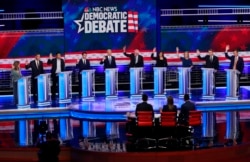Updated Aug. 6, 1:15PM
WASHINGTON — The mass shooting in El Paso, Texas, on Saturday has again highlighted concerns over President Donald Trump’s use of racially divisive language about immigrants and minorities.
The white suspect in the case, identified as Patrick Crusius, reportedly wrote an anti-immigrant manifesto before targeting Hispanic shoppers in a district near the Mexican border. At least 20 were killed by the shooter.
Fueling tensions
The governor of Texas called the mass shooting a hate crime and the U.S. Attorney in Texas is investigating it as a possible case of domestic terrorism.
Democratic presidential candidate Beto O'Rourke, a former congressman who represented El Paso, is among a number of critics accusing President Donald Trump of fueling racial tensions that escalated into deadly violence.
“The president's language, his rhetoric has produced the kinds of hate crimes that we saw in El Paso yesterday, but we've been seeing across this country — they've been on the rise for each one of the last three years," said O’Rourke.
In 2016, then-candidate Trump called Mexican immigrants rapists and criminals. As president, he has shied from denouncing some white supremacist groups, declaring that a 2017 white supremacist rally and counter-protest in Charlottesville, Virginia drew “fine people” on both sides. The event turned deadly when a rally participant drove a car into a group of counter-demonstrators, killing one and injuring many more.
However Trump's acting White House chief of staff, Mick Mulvaney, argued in a Sunday TV interview that it is unfair to blame the president for the actions of "sick" individuals.
"This was a sick person. The person in Dayton was a sick person. No politician is to blame for that. The people responsible here are the people who pulled the trigger," he said.
Mulvaney also maintained that Trump has condemned white nationalism, something he did again in public remarks Monday. “In one voice, our nation must condemn racism, bigotry, and white supremacy," Trump said in an abrupt pivot from other recent remarks denigrating immigrants and minorities.
Driving coverage
Political analysts see the president’s pattern of racially charged rhetoric as part instinct and part strategy to win re-election in 2020.
“I think he knows his supporters like to see him fight. And if you can fight with Democrats who are in the opposition that that only helps him politically from his perspective,” said Alex Conant, who worked on Senator’s Marco Rubio’s 2016 presidential campaign and is now a media consultant with Firehouse Strategies.
The president recently has been driving media coverage by engaging in attacks against minority lawmakers.
He singled out Democratic Congressman Elijah Cummings, calling his majority black district in the city of Baltimore, “a disgusting, rat and rodent infested mess.” Trump’s attack came after Cummings, the powerful chairman of the House Oversight Committee, denounced overcrowded and unsanitary conditions at migrant detention facilities near the border, which the president claimed were "clean" and "well run."
The House Oversight Committee is also investigating the White House for potential misconduct and has authorized subpoenas to seize emails and text messages from first daughter Ivanka Trump and her husband Jared Kushner, both advisers to the president.
Trump also continues to denounce a group of minority Democratic congresswoman as radical leftists. The group, known as the “squad,” include two Muslim Americans Ilhan Omar and Rashida Tlaib, both vocal critics of Israel, a key U.S. ally, Hispanic American Alexandria Ocasio Cortez, a self-described socialist, and African American Ayanna Pressley, who has called for impeachment proceedings against the president. Trump, in a Tweet, told the group to "go back" to the "broken and crime infested places from which they came" — even though only Omar is not American born.
Opponents see Trump’s high profile and controversial disputes as a strategic way to energize his base of disaffected white, working class voters, and to keep the nation's attention focused on himself ahead of next year’s election.
“The strategic part of it is that he's dominating the discourse. He's getting people fired up about things that concern him. They're not focused on his manifest failings as a president,” said John Halpin, a Democratic political analyst at the Center for American Progress.
Divided Democrats
To defeat Trump in 2020, Halpin says, Democrats need to focus first on economic issues, still-stagnant working class wages and increasing medical costs. Halpin said Democrats could seize issues like Trump's trade war with China, which cut U.S. agricultural exports, to highlight the gulf between the president's record and his populist rhetoric.
For their part, Democratic presidential candidates are divided over whether to push for moderate or transformational economic change. Progressives like Bernie Sanders and Elizabeth Warren are proposing that the government pay entirely for heath care and provide free college education to all. Both acknowledge that substantial tax hikes would be required to pay for such expansive programs.
Trump and Republicans, meanwhile, are trying to position the president as a moderate alternative to far-leftwing Democrats and to focus the election debate on the U.S. economy, which grew 3% last year, the tenth consecutive year of expansion.
“He would certainly like to have, you know, October of 2020 have people thinking about this caricature of the Democratic Party versus him as the standard bearer, the only person between you and radicalism,” said Halpin.
Wavering moderates
Among Republicans, Trump’s approval rating remains high at 72%, according to a recent Reuters/Ipsos public opinion poll.
Trump’s base, which includes anti-immigration activists, strongly backs his tough polices to deter immigration at the border, ban travel from several majority-Muslim countries, and to reinstate capital punishment at the federal level.
At the same time, analysts note that the president's penchant to inflame racial tensions, combined with reports of inhumane treatment of migrants in U.S. custody, may weaken moderate Republican support.
“If this becomes a referendum on Trump and his temperament, he does risk losing some of those particularly really suburban Republicans, in some cases women voters, who might like a lot of his policies but just don't like his tweets,” said Conant.
President Trump narrowly won the 2016 election in part by winning over white, working class people in key industrial states, a long-standing Democratic constituency. In the 2018 midterm elections, however, Trump's sinking approval ratings among independents helped Democrats regain control of the House of Representatives.
Exacerbating America's racial and ethnic divides may have helped propel Trump in 2016. Whether it helps or hurts his re-election bid in 2020 remains to be seen.










